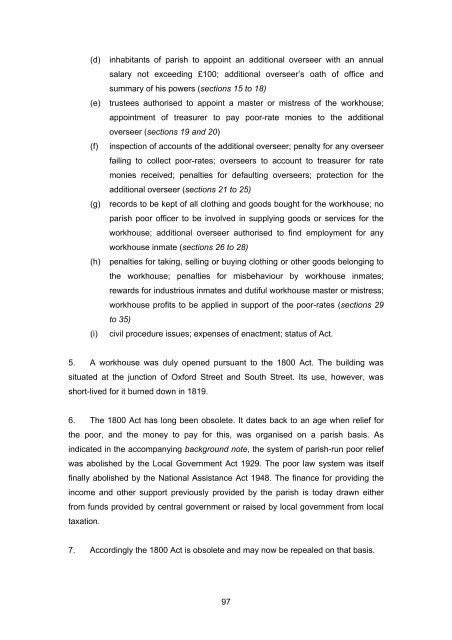Poor Relief - Law Commission
Poor Relief - Law Commission
Poor Relief - Law Commission
You also want an ePaper? Increase the reach of your titles
YUMPU automatically turns print PDFs into web optimized ePapers that Google loves.
(d) inhabitants of parish to appoint an additional overseer with an annual<br />
salary not exceeding £100; additional overseer’s oath of office and<br />
summary of his powers (sections 15 to 18)<br />
(e) trustees authorised to appoint a master or mistress of the workhouse;<br />
appointment of treasurer to pay poor-rate monies to the additional<br />
overseer (sections 19 and 20)<br />
(f) inspection of accounts of the additional overseer; penalty for any overseer<br />
failing to collect poor-rates; overseers to account to treasurer for rate<br />
monies received; penalties for defaulting overseers; protection for the<br />
additional overseer (sections 21 to 25)<br />
(g) records to be kept of all clothing and goods bought for the workhouse; no<br />
parish poor officer to be involved in supplying goods or services for the<br />
workhouse; additional overseer authorised to find employment for any<br />
workhouse inmate (sections 26 to 28)<br />
(h) penalties for taking, selling or buying clothing or other goods belonging to<br />
the workhouse; penalties for misbehaviour by workhouse inmates;<br />
rewards for industrious inmates and dutiful workhouse master or mistress;<br />
workhouse profits to be applied in support of the poor-rates (sections 29<br />
to 35)<br />
(i) civil procedure issues; expenses of enactment; status of Act.<br />
5. A workhouse was duly opened pursuant to the 1800 Act. The building was<br />
situated at the junction of Oxford Street and South Street. Its use, however, was<br />
short-lived for it burned down in 1819.<br />
6. The 1800 Act has long been obsolete. It dates back to an age when relief for<br />
the poor, and the money to pay for this, was organised on a parish basis. As<br />
indicated in the accompanying background note, the system of parish-run poor relief<br />
was abolished by the Local Government Act 1929. The poor law system was itself<br />
finally abolished by the National Assistance Act 1948. The finance for providing the<br />
income and other support previously provided by the parish is today drawn either<br />
from funds provided by central government or raised by local government from local<br />
taxation.<br />
7. Accordingly the 1800 Act is obsolete and may now be repealed on that basis.<br />
97
















